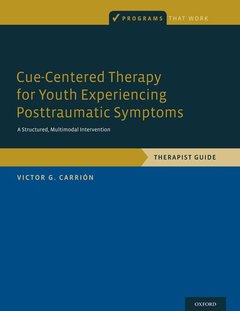Cue-Centered Therapy for Youth Experiencing Posttraumatic Symptoms A Structured Multi-Modal Intervention, Therapist Guide Programs That Work Series
Langue : Anglais
Auteur : Carrión Victor G.

Trauma can be defined as exposure to a shocking, distressing, or emotionally painful event that can result in negative mental and physical health effects. Due to its interference with development, childhood trauma is particularly detrimental and can result in symptoms including posttraumatic stress disorder, anxiety disorders, depression, dissociation, externalizing behavioral problems, and suicidal ideation. It can increase the risk of substance use, school disengagement, and academic difficulties, and it has been associated with attentional impairment, cognitive performance, and the development of self-regulation. Cue-Centered Therapy for Youth Experiencing Posttraumatic Symptoms presents a psychosocial treatment approach for children and adolescents who have been exposed to chronic traumatic experiences. Cue-Centered Therapy (CCT) derives its name from its focus on the conditioning process that results in sensitivity towards trauma-related cues. CCT addresses four core domains: cognition, behavior, emotions, and physiology, through a combination of empirically supported and CCT-specific interventions. This structured and flexible Therapist Guide focuses on helping the youth develop insight into his/her own patterns of behaviors and emotions. Rather than having youth attempt to "unlearn" maladaptive responses conditioned to cues, CCT focuses on creating new connections and behavioral responses. The treatment manual offers guidelines on conducting each of the sessions while respecting the individual therapist's own strengths. Through the use of visual icons, forms, and figures, the manual facilitates teaching relevant lessons. The therapy reduces negative cognitions, allows for emotional expression, identifies and changes trauma-related responses, empowers with knowledge and skills, and strengthens the relationship between the caregiver and his/her child.
Victor G. Carrión, MD, is a Professor of Psychiatry and Behavioral Sciences and Director of the Stanford Early Life Stress and Pediatric Anxiety Program at Stanford University. Dr. Carrión received his M.D. degree at Mount Sinai School of Medicine and completed his psychiatry residency at the University of Pennsylvania. He completed fellowship training in child and adolescent psychiatry, normal development, and developmental trauma at Stanford University. For the past twenty years Dr. Carrión has studied the biological, psychological, and social ramifications of early life stress and worked to develop systems of care that address this major public health issue.
Date de parution : 01-2016
Ouvrage de 224 p.
21.6x27.9 cm
Disponible chez l'éditeur (délai d'approvisionnement : 21 jours).
Prix indicatif 72,62 €
Ajouter au panierThèmes de Cue-Centered Therapy for Youth Experiencing... :
© 2024 LAVOISIER S.A.S.



